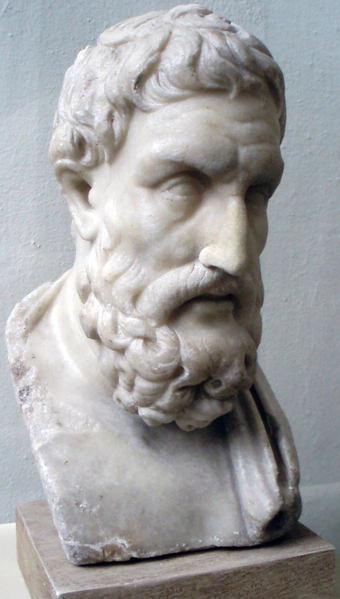Recently, in articles about hedonism (yeah they exist, and
yes I do read them), the term “eudemonia” keeps coming up. Usually it goes something like this:
“The Greek term eudemonia is often
mistranslated to mean ‘happiness,’ when in reality it encompassed much more
than happiness; more accurately the term refers to state of fulfillment…”
Inevitably, it is contrasted with “hedonism” already presumed
to be “wrong” and consequently “lesser than” eudemonia:
“The pursuit of pleasure is merely
hedonism, whereas true fulfillment and ‘eudemonia’ can only be obtained by…”
And here is where you fill in the blank with the author’s particular
belief as to what truly provides happiness and fulfillment e.g. God, service to
others, kindness, etc. But whatever the conclusion, hedonism is consistently
regarded an inadequate pursuit to any right minded individual.
 |
| Epicurus - The Original Hedonist |
Returning to the Greeks though, you’ll find the likes of
Epicurus arguing that the path to eudemonia is through the pursuit of pleasure.
So while the Greeks may have had these distinct terms, they didn't consider
them mutually exclusive.
I know I can be loose with my terms of hedonism, pleasure,
and the pursuit of happiness, but I guess my objective with this hedonism
project it’s to achieve eudemonia – fulfillment – and yes, even enlightenment.
So why Hedonism, why use that term for my pursuit? Well,
first off who wants to have to explain the term eudemonia every time you use it?
Second, I think it actually better describes what I am doing in my approach – That
is, once you get past the simplistic definitions of hedonism.
I think part of my hedonism is a reaction against asceticism
– the notion that enlightenment comes to those who deny and overcome their desires.
Whether through oaths of chastity or poverty, it seems widely accepted that
eliminating these “distractions” of desire somehow enables a “purer” sense of
being. I believe the Buddhists view desire as the source of suffering, and that
to eliminate suffering one must naturally eliminate desire.
 |
| Buddha ultimately gave up the ascetic life, but was he also a hedonist? |
Now, the Buddhists may be right. This may well be the way to
enlightenment (or Nirvana if you're a Buddhist). Still I wonder if there
might also be another path. This ascetic way of thinking seems like a byproduct
of a culture of scarcity; the notion that most desires remain unsatisfied, or
when fulfilled for one, necessitates their being denied to someone else. If I
eat that slice of pie no one else gets that slice.
Hedonism, or enlightened hedonism as I’ve come to term it, instead
comes from a culture of abundance. I’ve been clear that don’t think it’s a
possible pursuit before one’s basic needs are met. But those are taken care of
desires and pleasures fulfilled do not necessarily take away from the desires
or pleasures of others. Actually they can be grown, shared, and increased with
others through social interactions. Perhaps one can become enlightened by leading
an ascetic life, but I think the same might be true for someone pursuing life
as a connoisseur.
When people ordinarily use the term “hedonism,” I think “pleasure”
is defined too simplistically - that
they all ultimately reduce down to getting wealthy, famous, or laid. Those
desires have their place, but I think our desires are far more complex than
that. More importantly they often are at odds with each other. To me, this is
where their value lies. Confronting the contradictions in our desire force us
to make those existential decisions that define who we are.
A quick example from last weeks’ cocktail quest – Champagne
cocktail #3, a attempt to make a lemon based champagne cocktail. On the surface
this doesn’t sound all that significant, but take a look at some of the desires
that drove this quest:
 |
| Could a Failed Cocktail Lead to Enlightenment? |
- A desire to improve my skills in mixology and the use of champagne
- A desire Learn about Limoncello, a liquor I’ve never worked with
- A desire serve others by being a good host, providing good drink and entertainment
- A desire to feed my own ego for receiving praise for what I thought would be a sure winner of a cocktail
- A desire to be seen as an expert mixologist
- A desire to simply enjoy the pleasurable buzz of a cocktail.
Now the cocktail was a failure. It was a drink whose parts
were best enjoyed separately. So while I may have satisfied a few of the
desires noted above, I also failed to satisfy some. Did I come out ahead in the
decision to attempt this cocktail? I certainly learned something from the experiment,
and what I learned will help me be a better mixologist in the future, and
better satisfy those desires. Does that make me more enlightened? Or would I
have been more enlightened to have not engaged in the experiment at all and
just served my guests tap water or just ignored them altogether while I chanted
in the next room? Yeah, enlightened or not I think the later would have just
made me a pretentious prick.
It’s the decisions I make that define who I am, and I don’t
think I can make authentic decisions without acknowledging my desires – all of
them, the lazy ones, the self-conscious ones, the one’s that just want to get
drunk, along with the one’s that want to share with others, and help satisfy
their needs and desires. Heck, were I religious, I think the desire to serve
God, would also have to be a hedonistic quest for it to be a sincere one.
Simply put, hedonism is my path to eudemonia – or at least the one I’ve
chosen to follow.
Cheers




No comments:
Post a Comment